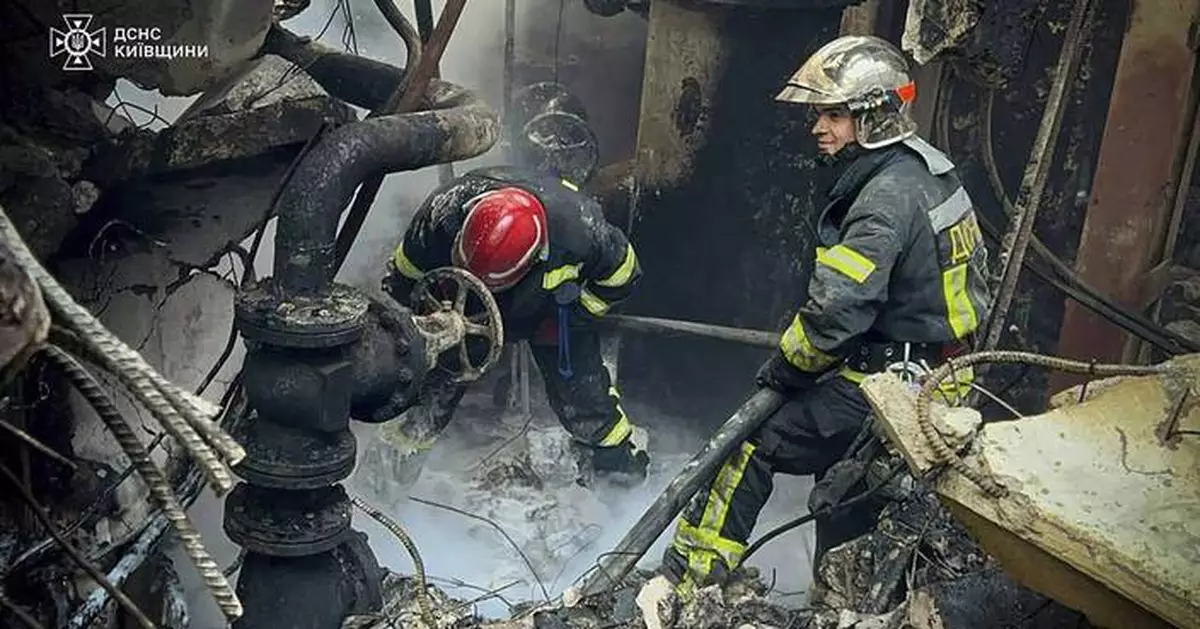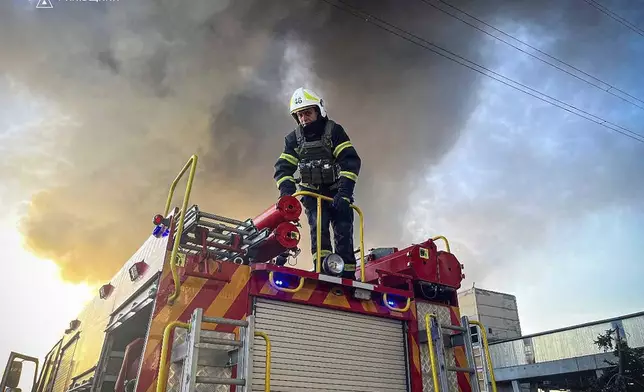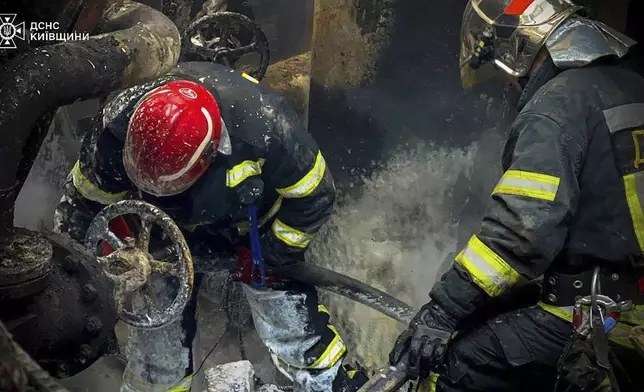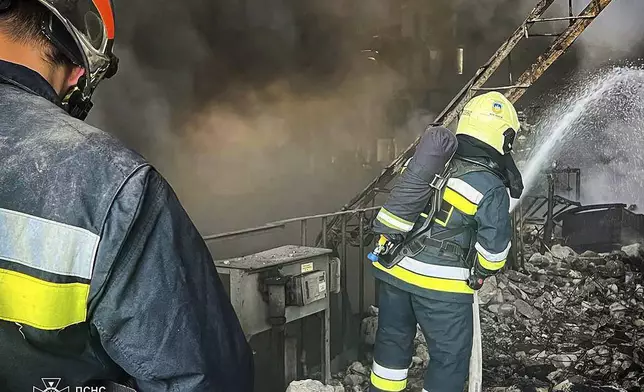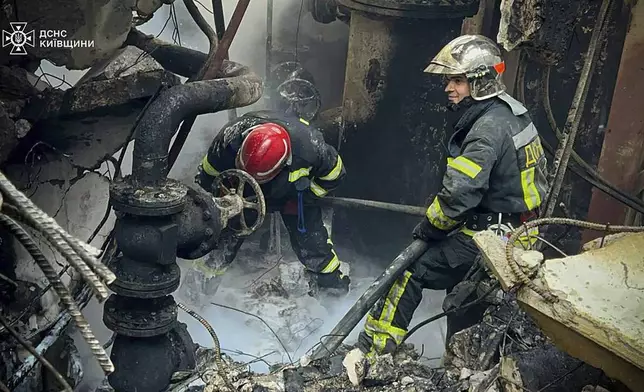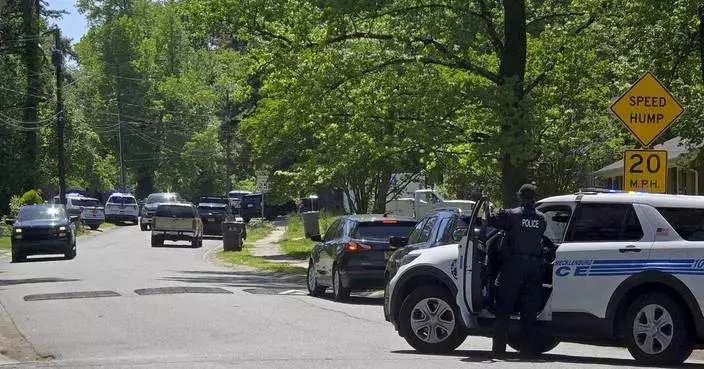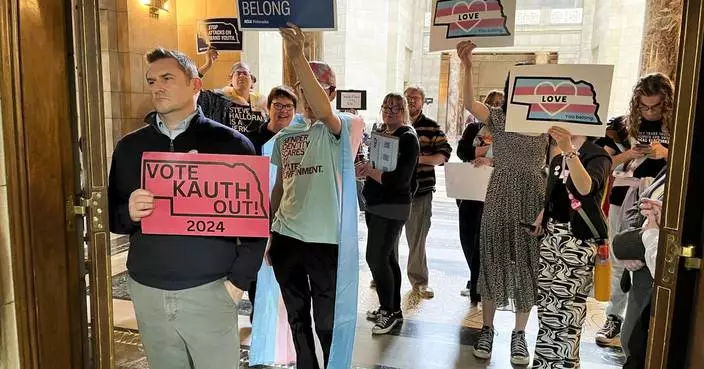A massive missile and drone attack destroyed one of Ukraine's largest power plants and damaged others, officials said Thursday, part of a renewed Russian campaign targeting energy infrastructure.
The Trypilska plant, which was the biggest energy supplier for the Kyiv, Cherkasy and Zhytomyr regions, was struck numerous times, destroying the transformer, turbines and generators and leaving the plant ablaze. As the first drone approached, workers hid in a shelter, saving their lives, said Andrii Gota, chairman of the supervisory board of the state company that runs the plant, Centrenergo.
Click to Gallery
A massive missile and drone attack destroyed one of Ukraine's largest power plants and damaged others, officials said Thursday, part of a renewed Russian campaign targeting energy infrastructure.
In this photo provided by the Ukrainian Emergency Service, an emergency worker extinguishes a fire after a Russian attack on the Trypilska thermal power plant in Ukrainka, Kyiv region, Ukraine, Thursday, April 11, 2024. (Ukrainian Emergency Service via AP)
In this photo provided by the Ukrainian Emergency Service, emergency workers extinguish a fire after a Russian attack on the Trypilska thermal power plant in Ukrainka, Kyiv region, Ukraine, Thursday, April 11, 2024. (Ukrainian Emergency Service via AP)
In this photo provided by the Ukrainian Emergency Service, emergency workers extinguish a fire after a Russian attack on the Trypilska thermal power plant in Ukrainka, Kyiv region, Ukraine, Thursday, April 11, 2024. (Ukrainian Emergency Service via AP)
In this photo provided by the Ukrainian Emergency Service, emergency workers extinguish a fire after a Russian attack on the Trypilska thermal power plant in Ukrainka, Kyiv region, Ukraine, Thursday, April 11, 2024. (Ukrainian Emergency Service via AP)
They watched the plant burn, surrounded by dense smoke and engulfed in flames. “It’s terrifying,” said Gota. Hours later, rescuers were still dismantling the rubble.
Speaking in Moscow, Russian President Vladimir Putin cast the attacks on Ukrainian energy facilities as a response to Ukrainian strikes that targeted Russian oil refineries.
The Trypilska plant supplied electricity to 3 million customers — but none lost power because the grid was able to compensate since demands are low at this time of year. Still, the consequences of the strikes could be felt in the coming months, as air conditioning use ramps up with summer.
At least 10 other strikes overnight damaged energy infrastructure in Kharkiv, Ukraine’s second-largest city. Foreign Minister Dmytro Kuleba said more than 200,000 people in the region, which has been struck repeatedly, were without power.
Ukraine's largest private energy operator, DTEK, described the slew of strikes as one of the most powerful attacks this year, while Energy Minister Herman Halushchenko told reporters it was a “large scale, enormous, missile attack that affected our energy sector very badly.”
Russia has recently renewed strikes on Ukrainian energy facilities, and attacks last month blacked out large parts of the country — a level of darkness not seen since the first days of the full-scale invasion in 2022.
The volume and accuracy of the attacks have alarmed the country’s defenders and left officials scrambling for better ways to protect energy assets. The strikes have also tested Ukraine’s ability to make quick repairs.
Ukraine’s leaders have pleaded for more air defense systems to ward off such attacks, but those supplies have been slow in coming.
“Today’s situation demonstrates that there’s nothing left to shoot down” the missiles, Gota said.
Associated Press writers Samya Kullab and Illia Novikov contributed to this report from Kyiv, Ukraine.

In this photo provided by the Ukrainian Emergency Service, an emergency worker extinguishes a fire after a Russian attack on the Trypilska thermal power plant in Ukrainka, Kyiv region, Ukraine, Thursday, April 11, 2024. (Ukrainian Emergency Service via AP)

In this photo provided by the Ukrainian Emergency Service, an emergency worker extinguishes a fire after a Russian attack on the Trypilska thermal power plant in Ukrainka, Kyiv region, Ukraine, Thursday, April 11, 2024. (Ukrainian Emergency Service via AP)

In this photo provided by the Ukrainian Emergency Service, emergency workers extinguish a fire after a Russian attack on the Trypilska thermal power plant in Ukrainka, Kyiv region, Ukraine, Thursday, April 11, 2024. (Ukrainian Emergency Service via AP)

In this photo provided by the Ukrainian Emergency Service, emergency workers extinguish a fire after a Russian attack on the Trypilska thermal power plant in Ukrainka, Kyiv region, Ukraine, Thursday, April 11, 2024. (Ukrainian Emergency Service via AP)

In this photo provided by the Ukrainian Emergency Service, emergency workers extinguish a fire after a Russian attack on the Trypilska thermal power plant in Ukrainka, Kyiv region, Ukraine, Thursday, April 11, 2024. (Ukrainian Emergency Service via AP)
It’s wine time. Beer Thirty. Happy hour. Five o’clock somewhere.
Maybe it's also time to rethink drinking?
Moderate drinking was once thought to have benefits for the heart, but better research methods have thrown cold water on that.
“Drinking less is a great way to be healthier,” said Dr. Timothy Naimi, who directs the Canadian Institute for Substance Use Research at the University of Victoria in British Columbia.
Guidelines vary a lot from country to country but the overall trend is toward drinking less.
The United Kingdom, France, Denmark, Holland and Australia recently reviewed new evidence and lowered their alcohol consumption recommendations. Ireland will require cancer warning labels on alcohol starting in 2026.
“The scientific consensus has shifted due to the overwhelming evidence linking alcohol to over 200 health conditions, including cancers, cardiovascular diseases and injuries,” said Carina Ferreira-Borges, regional adviser for alcohol at the World Health Organization regional office for Europe.
From Dry January to Sober October to bartenders getting creative with non-alcoholic cocktails, there's a cultural vibe that supports cutting back.
"People my age are way more accepting of it," said Tessa Weber, 28, of Austin, Texas. She stopped drinking for Dry January this year because she'd noticed alcohol was increasing her anxiety. She liked the results — better sleep, more energy — and has stuck with it.
“It’s good to reevaluate your relationship with alcohol,” Weber said.
That idea came from imperfect studies comparing groups of people by how much they drink. Usually, consumption was measured at one point in time. And none of the studies randomly assigned people to drink or not drink, so they couldn’t prove cause and effect.
People who report drinking moderately tend to have higher levels of education, higher incomes and better access to health care, Naimi said.
“It turns out that when you adjust for those things, the benefits tend to disappear,” he said.
Another problem: Most studies didn’t include younger people. Almost half of the people who die from alcohol-related causes die before the age of 50.
“If you’re studying people who survived into middle age, didn’t quit drinking because of a problem and didn’t become a heavy drinker, that’s a very select group,” Naimi said. “It creates an appearance of a benefit for moderate drinkers that is actually a statistical illusion.”
Other studies challenge the idea that alcohol has benefits. These studies compare people with a gene variant that makes it unpleasant to drink to people without the gene variant. People with the variant tend to drink very little or not at all. One of these studies found people with the gene variant have a lower risk of heart disease — another blow to the idea that alcohol protects people from heart problems.
That depends.
Drinking raises the risk of several types of cancer, including colon, liver, breast and mouth and throat. Alcohol breaks down in the body into a substance called acetaldehyde, which can damage your cells and stop them from repairing themselves. That creates the conditions for cancer to grow.
Thousands of U.S. deaths per year could be prevented if people followed the government’s dietary guidelines, which advise men to limit themselves to two drinks or fewer per day and women to one drink or fewer per day, Naimi said.
One drink is the equivalent of about one 12-ounce can of beer, a 5-ounce glass of wine or a shot of liquor.
Naimi served on an advisory committee that wanted to lower the recommendation for men to one drink per day. That advice was considered and rejected when the federal recommendations came out in 2020.
“The simple message that’s best supported by the evidence is that, if you drink, less is better when it comes to health,” Naimi said.
The Associated Press Health and Science Department receives support from the Howard Hughes Medical Institute’s Science and Educational Media Group. The AP is solely responsible for all content.

FILE - Bottles of alcohol sit on shelves at a bar in Houston on June 23, 2020. Moderate drinking was once thought to have benefits for the heart, but better research methods starting in the 2010s have thrown cold water on that. (AP Photo/David J. Phillip, File)







